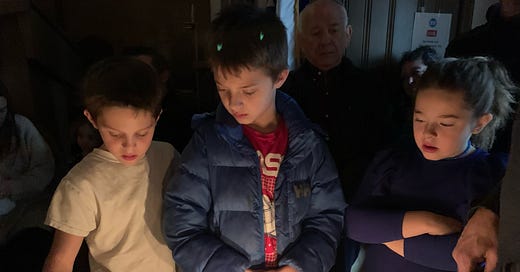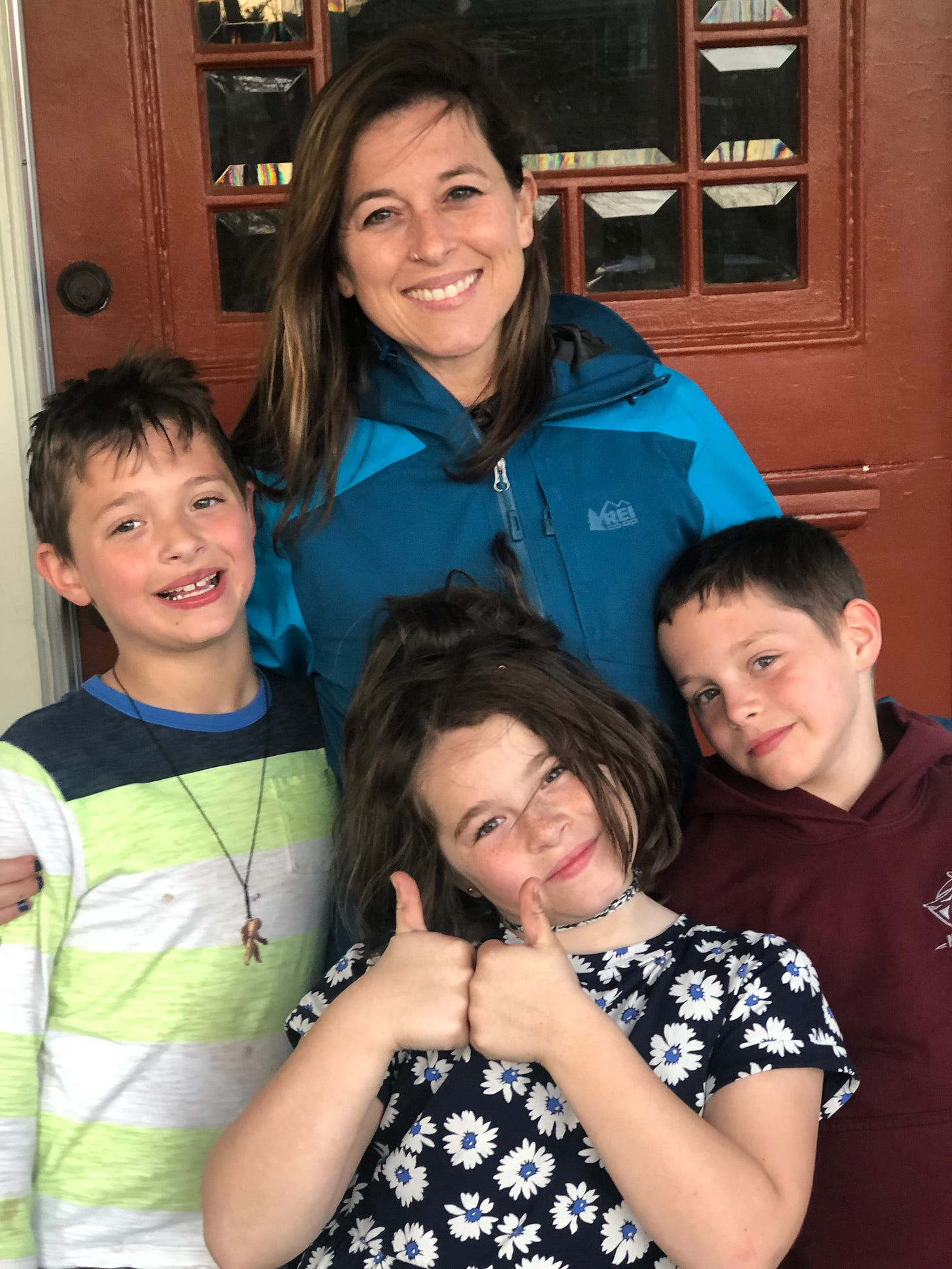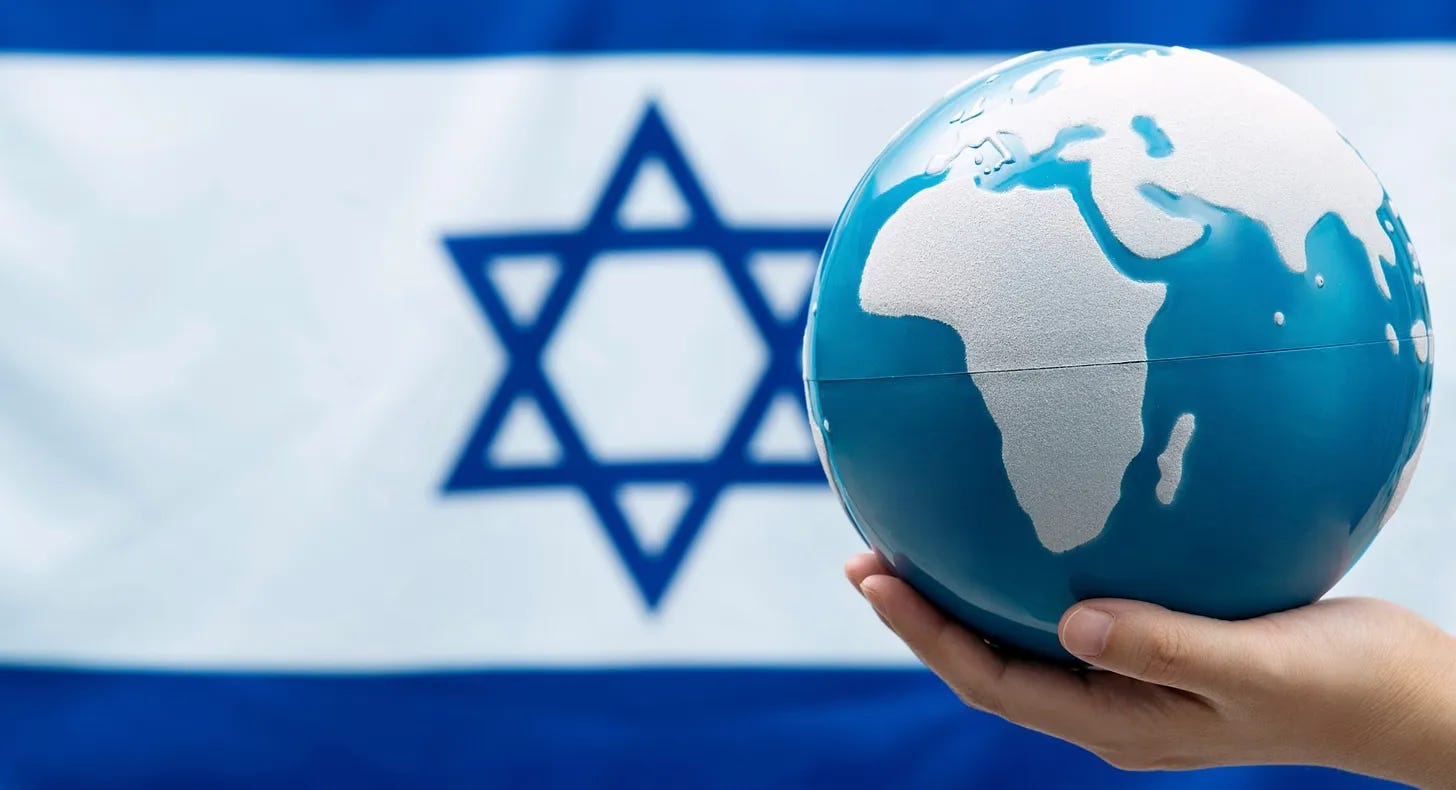Raising Proud Jewish Feminists — Even in the Face of Outdated Customs
"Whilst we have no shortage of wonderful, powerful Jewish women — pioneers of equality and equity — it's hard to find support for them in the words of our faith’s written traditions."
By Allison Fishman Task
I always hoped that my children would be feminists. I remember buying “My First Book of Feminism (for Boys) for my twin sons and so hoped they’d support, well, me, their sister, and all people in their peoplehood.
Recently, my daughter has, erm, exceeded my expectations in the feminism category. She’s thinking thoughts that I have never been able to think, raised as I was, in the 70s and 80s culture (on Long Island).
For example:
This morning, we were listening to the Bee Gees’ “Staying Alive.” My 10-year-old daughter knows all the words and hearing her sing about being “a woman’s man,” I had to ask…
Me: What do you think a “woman’s man” is?
Daughter (no pause): A man that does things that, back in olden times, a woman was expected to do. He cooks and cleans and takes care of kids. He supports women.
Mmmmhmmmm. That’s a very uncluttered analysis of the Bee Gees’ phrase. I’m pretty sure she’s dead wrong, but she had me at the notion that “a woman’s man” is a man who supports women. I think she’s heard the phrase “girls’ girl,” and so she’s drawing parallels.
Similarly, we were recently listening to Joe Cocker’s “You Are So Beautiful.” I remember hearing that song as a teen, hoping that one day someone would admire me the way Joe painfully, achingly adores this woman in the song.
But, no surprise, my daughter heard it differently. In fact, she talked back to the singer in a way that never occurred to me. I think she heard his clingy desperation, or as the kids call it, ‘thirstiness,’ and it was a hard stop for her.
Joe: You are so beautiful…
Daughter: I know
Joe: To me…
Daughter: And to everyone else.
Joe: Can't you see
Daughter: Yup. I have a mirror
Joe: You're everything I hoped for.
Daughter: What? You don’t even know me.
Joe: You're everything I need.
Daughter: OK, you’re weird.
Joe: You are so beautiful to me
Daughter: Mom, turn this weird song off.
So many of the songs she listens to (again, she’s 10) are like “stop,” “hold up” and focus more on what the woman wants rather than being the object of desire.
It’s refreshing.
So, where does Judaism come in? (both you and my editor at this point might want to know). Well, it’s Purim, the magical holiday of Esther, who uses her beauty and power to seduce King Ahasuerus and save the Jews.
Big story of a woman using her wiles to help our people; our bawdiest holiday of the year. And yet. And yet…
I feel like I’m consistently hitting a brick wall when it comes to Judaism as a feminist (supporting of gender and human equity) religion, and I feel like it’s *really* falling down on the gender part. Now hear me when I say, Jewish women are a powerful lot, but that may be despite our religion.
I’ve heard tell that there are prayers men say in the morning where they thank God they’re not a woman. That feels icky.
I recently pursued the Jewish idea that women are more spiritual, and closer to God than men. Upon further examination, that notion really turned out to be a sort of free pass from shul so that the ladies could prepare a nice kiddush lunch, so to speak.
And then there’s the pesky process of the ‘get’ — that wonderful document a woman must procure to undo a Jewish marriage in the eyes of Judaism. This is called agunah, and from what I can tell, it must be the husband who initiates it and the wife who is presented the get. It’s not gender neutral, the process flows in one, and only one direction.
I know this personally because when I married, my fiance and I met with the Rabbi who asked if my fiance had procured a get from his first marriage. He had not. I remember the rabbi stood up, shook his head, and said: “C’mon man, do the right thing.” He proceeded to look up the number of a guy who knew a guy, and everything got resolved pretty quickly.
But yeah, the stress of the possibility of his ex-wife refusing to agree three weeks before my wedding was a headache I didn’t need.
Now that I find myself in need of a get of my own, I bounced into my (new) rabbi’s office and told her I looked forward to making this a real feminist experience — an opportunity for self-advocacy and healing. She cringed a little bit and said: “Do you know how the get process works?”
I was recently asked to speak at a ceremony where my daughter received her first Siddur (prayer book). I spoke of her strength and kindness. I spoke of great Jewish women who came before her — Golda Meir, Gilda Radner and Gal Gadot (someone messed up my alliteration by adding Claudia Sheinbaum to the list, but who am I to stand on semitic semantics).
So whilst we have no shortage of wonderful, powerful Jewish women, pioneers of equality and equity, it’s hard to find support for these wonderful people in the words of our faith’s written traditions. Not in prayer, not in Megillah, and not in processes.
As an American Jewish woman, single mother, business owner and homeowner, I am looking for safe places these days. I can read Project 2025 — and it feels personal.
While the community of my synagogue may feel like a safe place for me and my feminist brood, the words we pray feel less so.
Progress has been made in modern Judaism, and I hope it continues. And I’d like to stay with my conservative Jewish group, just push its edges a bit. A fellow congregant was recently making a case for rebranding ourselves ‘conservationists’ instead of conservatives. This would allow us to protect and preserve our approach, whilst evolving in a healthful way.
Evolving humanism, a very feminist thing to do.
ALLISON FISHMAN TASK is a life and career coach and the bestselling author of Personal (R)evolution.
From unpacking history and politics to navigating the nuances of family and personal relationships to finding the human angle on sports and entertainment — plus our unsparing take on what’s happening in the Jewish world — the canvas at JEWDICIOUS is limitless! JOIN US!!







Your daughter sounds like she is going to be a strong woman one day!
I love your description of her hearing Joe Cocker’s “You Are So Beautiful.”! It was hilarious!
If I may I disagree with a few things you have written, and I'd like to address them here.
I am a baalas teshuva (I became religious later in life, my parents weren't religious), so I can see how some of the things you have written about may be seen as anti-feminist.
"Esther, who uses her beauty and power to seduce King Ahasuerus and save the Jews. "
No she didn't. She was captured against her will, and after that she used ingenuity to save her people. I suggest you read 'Let My Nation Live' by Yosef Deutsch.
It is a fascinating book, that reads like a novel, and goes into the details of the megillah.
Reading this book will help you understand better who Esther really was.
"I’ve heard tell that there are prayers men say in the morning where they thank God they’re not a woman. That feels icky."
The prayer you are talking about, is one of the morning blessing:
"Blessed are You, God our Lord, King of the universe, Who has not made me a woman."
But the reason behind this is simple. Men have more mitzvos (commandments) to keep, so they are thanking for that.
I know it may sound lame, but trust me, the good part is coming now.
Rav S. R. Hirsch, The Hirsch Siddur, p. 13.
This is not a prayer of thanks that God did not make us women. Rather, it calls upon us to contemplate the task which God has imposed upon us by making us free Jewish men, and to pledge ourselves to do justice to this mission.
Men should recognize that the privilege of being obligated in more mitzvot brings with it great responsibility. The berachot (blessings) they recite bear a message beyond simple praise. In reciting a beracha over being commanded in more mitzvot, men’s focus should be on undertaking their unique obligations with utmost seriousness.
In my opinion (I am not a rebbetzen or a rabbi) this means that "With great power comes great responsibility" (spiderman), well not really.
With more mitzvos come more responsibility.
But why do they get to have more mitzvos?
Men have the obligation to pray 3 times a day and learn Torah every day, preferably to learn Torah every free minute of the day.
Why?
Because men are pigs.
If their days are not filled with thoughts of Hashem and his Torah, they will fill it with thoughts of sins.
It is usually explained in a more refined manner, but it is the gist of it.
That is why men have to wear tzitzis (long white strings hanging of the corners of the garment) because when they look down and see the tzitzis, it will remind them that there is a G-d, and this will hopefully keep them away from sinning.
When you look at it that way, the Torah doesn't think much about men's ability for self control.
So yes, when you look at it from this point of view, women ARE more spiritual than man.
Women are not obligated in Torah studies and praying 3 times a day, because, their responsibilities come first, such as raising children.
If it is time for the morning prayers and the baby is crying because she needs to be nursed, the baby's needs come first.
If it is time for afternoon prayers, but a child is crying because he has a boo-boo, comforting the child comes first.
If it is time for evening prayers, but it it also bedtime for the little ones, the children come first.
Although if a woman has no small children yet or are grown enough to survive an hour in the morning and 20 minutes twice a day without their mother, than a woman should pray. And learn Torah, that is important in her mitzva observance, such as the laws of Shabbos, the laws of kashrus, etc.
Women say instead:
"Blessed are You, God our Lord, King of the universe, who made me according to His will!"
"A woman clearly cannot recite a beracha over not being made a woman. And yet, a woman owes God gratitude for being created as a woman."
"although man and woman were originally created as a single, hybrid creature, God’s original vision and will for humanity was that woman should be a distinct “complete” entity. In “She-asani Kirtzono” a woman blesses God who made her a complete human being, distinct from man, as God always willed it."
"that wonderful document a woman must procure to undo a Jewish marriage in the eyes of Judaism. This is called agunah, and from what I can tell, it must be the husband who initiates it and the wife who is presented the get. It’s not gender neutral, the process flows in one, and only one direction."
Let me clarify this for you.
Agunah is a woman who cannot get married again, because the husband refuses to give her a gett.
Nowadays men only can have one wife, so if he wants to get married again, he'll have to provide a gett.
If a man refuses to give his wife a gett, out of malice, the beis din (religious court) has the right to put him in a cherem (ostracize).
Yes, a man has to give the get to his wife, but the proceedings can be started by the wife.
I myself went to the local beis din to start the gett proceedings, for my divorce, and nobody bated an eyelash. It is acceptable.
A man can only give his wife a gett if she accepts it!!!!! It IS a two way street.
In Judaism women have rights!
And if you want to speak of strong feminine figures.
Look at Devorah the prophetess.
Look at Esther!
In our generation, look et Rebbetzin Batsheva Kanievsky (read her biography!)
Here is one thing that feminists like to talk about, but the Torah disagrees.
If a woman is pregnant and doesn't want her baby, the feminists say, that this is her own body, and she can do whatever she wants with it.
Wrong.
There is child, another person, a human being with a soul, who also has rights.
As long as the child is in the woman's body, she can't "do whatever she wants with her body" because there is another person cohabits in her body, killing it would be murder.
Feminism has it's place, and have done a lot of great things to protect women's rights, but in this respect they took it too far.
And in any case our body (both men and women) is a vehicle for our soul, to be able to do mitzvos.
Our body is a gift from Hashem, it is holy, and we have to look after it.
What does it mean?
Live a healthy life, don't hurt our body our on purpose (tatoos etc.). If there is a health concern, one should do what they can to address it (take meds and have surgery if necessary, etc.).
If you have any questions regarding what I just wrote, pls keep in touch!
Please write me either here or send me an email
estherbuchman.thewriter@gmail.com.
I appreciate your desire for your daughter and all Jewish girls and women to feel they have equal agency with men in the Jewish world. But Judaism isn't about gender neutrality. There are different roles for each, based on inherent and generally accepted emotional and intellectual strengths of each, as well as their needs as individuals and the needs of the community. (There isn't even neutrality among men: men who are from the Kohen line have both more obligations and limitations in their role than from those from the tribe of Levi, and then again from the majority who are considered from Israel.) I promise that if you look more deeply into the role of Jewish women in the Bible--truly studying beyond a cursory reading, which only hints at the full story--you will see remarkable power and agency throughout, from all the matriarchs and through the prophetesses and more. So it is absolutely a canard to claim that it's hard to find support for them in the writings. Clearly, you have not had an opportunity to learn about our incredible women. For example, Esther did not seduce Achashverosh. Hardly! She was taken against her will. Studying deep sources from the Book of Esther you will be astonished to learn of how she used her political instincts and psychological intuitiveness to bring down Haman and the decree against the Jews. Women in the Bible are frequently seen as being right and their husbands or other males in more powerful roles, wrong. This happens over and over again. Also, adjacent topic, Judaism considers a person to be Jewish based on the mother, not the father. While there are many discrepancies in roles and some of these discrepancies can feel not only unequal but dismissive, consider how strongly the value and influence of a Jewish woman is for her to be the parent on whom a child's whole spiritual destiny lies. If you would like more insights into our Jewish ancestresses to better appreciate their role, I'd recommend Laya Saul's "Women of the Copper Mirrors." It's an engaging yet deep read.